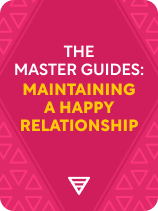

This article is an excerpt from the Shortform book guide to "The Master Guides: Maintaining a Happy Relationship" by Shortform. Shortform has the world's best summaries and analyses of books you should be reading.
Like this article? Sign up for a free trial here.
What’s the secret to a happy long-term relationship? What should you do, and what should you avoid?
If you’re regularly fighting with your partner or just feeling a little bored, staying happy may seem more easily said than done. But, maintaining a happy romantic relationship isn’t as difficult as it can seem—as long as you’re armed with the right knowledge.
Read on for expert advice on how to maintain a healthy relationship with your partner.
How to Maintain a Healthy Relationship
We’ll draw from the work of 11 relationship experts—including renowned relationship researchers John and Julie Schwartz Gottman and noted couples therapist Esther Perel—to lay out the secrets to maintaining a happy romantic relationship. We’ll discuss the importance of understanding your needs and your partner’s and share the experts’ tips for sustaining both emotional and physical intimacy. We’ll also explain why conflict can ruin your relationship—and describe how to handle conflict effectively so that it doesn’t. Let’s get started with their advice on how to maintain a healthy relationship with your partner for the long haul.
Understand Your Needs and Your Partner’s
One essential element of maintaining a happy relationship is to understand both your needs and your partner’s. Specifically, relationship experts recommend understanding your attachment styles and your love languages.
Understand Your Attachment Styles
In Attached, psychiatrist Amir Levine and psychologist Rachel Heller contend that the best way to create a relationship that fulfills your emotional needs is to understand both your own and your partner’s attachment styles—the beliefs and behaviors that determine how you function in intimate relationships.
There are three main attachment styles: secure, anxious, and avoidant.
- Secure attachers are nurturing, responsive, and comfortable with intimacy.
- Anxious attachers are preoccupied with making their relationship solid and constantly seek reassurance from their partner.
- Avoidant attachers are more distant and see intimacy as a threat to their independence.
If you’re a secure attacher, your major relationship goal is to maintain your secure attachment style. If you’re an anxious attacher, accepting your romantic needs is critical to developing a happy relationship. If you’re an avoidant attacher, developing a happy relationship depends on recognizing and combating the techniques you use to maintain emotional distance from your partner.
Understand Your Love Languages
In The 5 Love Languages, Gary Chapman argues that the way you understand love depends on your love language—the types of actions or behaviors that make you feel the most loved. To help your partner feel loved, you must learn which language they speak. According to Chapman, the five languages of love are Words of Affirmation, Quality Time, Receiving Gifts, Acts of Service, and Physical Touch.
You can identify your love language by reflecting on what makes you feel most loved, what makes you feel hurt or unloved, and how you treat your partner.
To identify your partner’s love language, self-help expert Jack Canfield offers three tips in The Success Principles:
- Listen to what they ask of you.
- Watch how they behave with other people.
- Note their complaints.
You can tell you’ve identified someone’s love language when they respond favorably to what you did.
Maintain Emotional Intimacy
Relationship experts contend that another key to maintaining a happy romantic relationship is to sustain emotional intimacy. Specifically, they suggest that you regularly connect with each other and let each other and your relationship evolve.
Connect With Your Partner
In The Seven Principles for Making Marriage Work, relationship researcher John Gottman and coauthor Nan Silver highlight the importance of connecting regularly with your partner so that you can maintain your connection long-term. They explain that happy couples regularly respond to each other’s bids, or overtures for connection.
To improve how often you respond to your partner’s overtures, Gottman and Silver suggest that you intentionally reconnect each evening.
Let Each Other Evolve
In Eight Dates, Gottman, his wife—fellow relationship researcher Julie Schwartz Gottman—and married couple Doug Abrams and Rachel Carlton Abrams also highlight the importance of connecting regularly with your partner. The authors explain that relationships last when both people support the evolution and growth of their partner, as individuals and as a couple. So to support each other’s growth, you and your partner need to set aside time to continue learning about each other through intentional conversation and open-ended questions.
Let the Relationship Evolve
While the authors of Eight Dates highlight the importance of letting each other evolve, How to Not Die Alone author Logan Ury emphasizes the importance of building a relationship that can grow with you. She explains that most people recognize that they’ve changed a lot in the past, but they don’t expect to change a lot in the future. But in reality, you (and your partner) will probably change just as much in the future as you did in the past. Therefore, it’s critical to ensure that your relationship evolves, too.
Maintain Physical Intimacy
In addition to maintaining emotional intimacy over time, maintaining physical intimacy is a key aspect of maintaining a happy relationship. To do so, relationship experts recommend that you communicate about sex. However, their recommendations for how to communicate about sex differ.
Talk About Sex
The authors of Eight Dates argue that a healthy sex life depends on honest conversation. The authors offer a few tips for talking about sex with your partner. First, make sure you’re not doing it right before, during, or after sex. Since it’s a delicate topic, bringing it up in the moment is a recipe for disaster. Second, don’t underestimate the power of humor.
Try Non-Verbal Communication
In Mating in Captivity, couples therapist Esther Perel suggests that talking about sex isn’t always the right choice. Perel explains that, in modern times, talking has become the default language for intimacy. Women are socialized to be good at verbal communication, they build (and expect men to build) intimacy by talking. Men, however, have been socialized to take a more physical approach when expressing themselves. They’re often more comfortable developing intimacy through non-verbal communication, for example, through touch or sex.
Handle Conflict Effectively
No matter how well you maintain emotional and physical intimacy, you—like every couple—will inevitably face conflict. But you can still have a happy relationship despite these conflicts, as long as you learn to manage them effectively. Specifically, relationship experts recommend that you learn to recognize damaging patterns so that you can avoid them and learn to fight in a healthy manner.
Recognize Damaging Patterns
In The Seven Principles for Making Marriage Work, Gottman and Silver explain that conflicts can destroy relationships if they induce regular flooding—a psychological phenomenon in which one partner feels so emotionally stressed that they’re unable to respond rationally to their spouse. The authors name four damaging patterns of behavior—the “four horsemen of the apocalypse”—that you should watch out for because they may heighten the risk of flooding, which leads spouses to emotionally detach from one another.
- Criticism
- Contempt
- Defensiveness
- Stonewalling
How Anxious-Avoidant Pairs Struggle
In Attached, Levine and Heller describe another damaging pattern of behavior that couples may fall into. A couple may get stuck in a cycle of conflict because their intimacy needs clash. If one partner is avoidant (generally uncomfortable with intimacy) and the other is anxious (highly desirous of intimacy), the anxious attacher always wants to be closer. The avoidant attacher will occasionally accept increased intimacy but soon grow uncomfortable and withdraw. The anxious attacher responds to this withdrawal by trying to reconnect—which repels the avoidant partner even more.
Fight Healthily
Now that you’re aware of the types of damaging conflict-related behavioral patterns you may fall into, how can you fight more effectively?
Reduce Flooding
As we’ve seen, Gottman and Silver warn against the four horsemen because they heighten the risk of flooding. However, there are things you can do during your argument to stop yourself and your partner from engaging in the four horsemen—and to mitigate their impact if one of you does.
First, the authors suggest that you adjust the beginning. If you begin the conversation negatively, you’re more likely to induce a negative response. Second, calm down. Gottman and Silver note that if you’re feeling flooded—which you may feel if you or your partner engages in one of the four horsemen—you likely won’t be able to have a productive discussion. So pay attention to your emotional and physical state: If you feel as though you’re about to blow up on your partner or your heart rate rises dramatically, you’re likely flooded. If so, take a 20-minute break to calm yourself. Once you’ve calmed yourself, try calming your partner.
Fight Like a Secure Attacher
In Attached, Levine and Heller suggest another strategy for fighting more effectively in relationships: Learn to fight like a secure attacher, who generally has a healthy and comfortable relationship with intimacy.
Levine and Heller name four strategies you can adopt to handle conflicts in a way that will bring you closer.
- Show genuine concern for the other person’s feelings.
- Keep the argument centered on the present issue.
- Be willing to take part in the discussion.
- Openly communicate your needs and feelings.
Talk About How You Manage Conflict
Improving your ability to manage conflicts doesn’t just involve changing how you behave during the fight. In Eight Dates, the authors recommend that you have a date night dedicated to understanding how your partner manages disagreements and how you can manage disagreements more effectively as a couple. They explain that to resolve disagreements effectively, you must approach each one as an opportunity to increase your understanding of the other person—not as an opportunity to win.
Exercise: Evaluate Your Relationship
Now that you’ve had a brief overview of the experts’ tips for maintaining a happy relationship, think about how you could apply what you’ve learned to your own life.
- Briefly describe your relationship. What are you most and least satisfied with?
- What’s something you learned from this that you could use to improve the aspect of your relationship that you’re most satisfied with? For example, even if you’re happy with your sex life, you may consider implementing more non-verbal communication by hugging your partner more regularly.
- What’s something you learned from this that you think could improve the aspect of your relationship that you’re least satisfied with? For example, if every fight turns into a blowout, you could focus on softening the beginning of your arguments.

———End of Preview———
Like what you just read? Read the rest of the world's best book summary and analysis of Shortform's "The Master Guides: Maintaining a Happy Relationship" at Shortform.
Here's what you'll find in our full The Master Guides: Maintaining a Happy Relationship summary:
- Advice from top relationship experts on how to maintain a happy relationship
- How to sustain both emotional and physical intimacy
- How to handle conflict so it doesn't ruin your relationship






